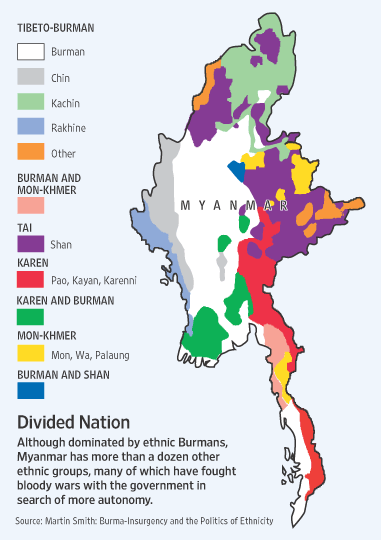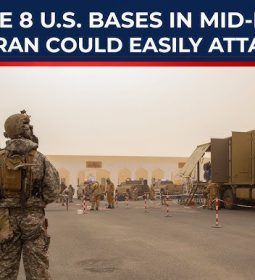After Rohingya muslims, time to persecute christians in Myanmar: Burmese military steps up operations against Christian minority

By Holly McCay
07/02/2019
The Burmese military has stepped up its operations against the country’s mostly Christian minority and driven hundreds more from their homes and jobs, according to human rights groups, as the conflict between the government and the Karen ethnic group marks its 70th anniversary.
“Violations of the (2015) nationwide cease-fire agreement (NCA) and clashes have resumed. In January 2019 alone, the Karen National Liberation Army (KNLA) were forced to destroy at least five Burma Army military vehicles attempting to attack deeper into Karen territory, and the Burma Army has begun shelling Karen civilian villages,” Ephraim Mattos, East Asia Operations Manager for The Nazarene Fund, told Fox News. “These clashes are happening in several places along the same road that caused major problems last year.”
Since Burma gained independence from the British in 1948, ethnic minorities – perhaps most significantly the Karen – have been locked in a simmering succession of war and alleged crimes against humanity in their quest to establish and maintain their independence. The Karen National Union (KNU), a political organization that represents the interests of the minority Karen and whose armed wing, the Karen National Liberation Army (KNLA), agreed to what was hailed as a landmark agreement in 2015.
But that piece of paper has not put a stop the fighting.

“From January 18 until today, the Burma Army has been launching mortars from two different military outposts at civilian villages in an ongoing series of coordinated attacks,” said Mattos. While there have been no reports yet of civilian casualties, at least 200 Karen villagers – more than 80 percent of whom are Christian and facing the Buddhist-majority military – are said to be hiding in the jungle.
“However, dozens of village animals – their livelihood – have been killed or wounded. All of this was the week leading up to the January 31st 70th anniversary of the war. Mortars from both bases simultaneously have been targeting the same areas,” Mattos contended. “The mortar barrages last anywhere from 1 to 12 hours and have killed dozens of livestock in the villages.”
Further documented violations allege that on the evening of Jan. 24, the Burma Army fired on Karen civilians walking in the hills around their own villages, screaming and taunting them as civilians ran for safety. No one was injured. Then on Jan. 31 – the 70th anniversary of the Karen Revolution – the Burma Army opened fire with mortars and machine-gun fire on KNLA defensive positions in the Paw Kay Kho area.
The uptick in skirmishes this year alone has prompted hundreds from the already impoverished minority to flee their homes. One exclusive video shot by the Nazarene Fund’s relief team on Jan. 25 in the Paw Kay Kho area, and viewed by Fox News, shows a female village leader carrying her belongings and fleeing apparent fighting.
“The Burma Army is shooting mortars and it not safe to live in the village. We are moving to the head of the river,” the leader informs the aid worker, detailing that her buffalo were hit with mortar rounds and that her entire family was afraid to stay in their homes. In another video, shot on the same day in the same area, children are seen fleeing apparent conflict.
A third video taken on Jan. 26 in Paw Kay Kho – filmed by the KNLA defense fighters – shows them seemingly holding defensive positions in preparation for a potential Burma Army ground assault. They claim all the background shooting is “coming from the Burma Army who are firing into Karen areas in violation of the NCA.”
Greh Moo, a community activist with the Karen Organization of America, who travels back and forth between the region and the United States, pointed out most parts of the semi-autonomous state remain peaceful. But he said there is still deep mistrust between the two sides, and concerns tensions will escalate.
“In the north, relations are still tense as the Burma Army fails to follow the ceasefire agreement, especially in terms of their territorial breach, their construction of a road and upgrade in military bases,” he said. “Early last month there was another skirmish between the Karen and Burmese army in Brigade 5 after the Burmese army again intruded into Karen territory against the ceasefire agreement. This again resulted in over one thousand Karen civilians fleeing their villages.”
Moo also said that despite seven years of negotiations and a peace process, “the Burmese army has not removed or downgraded any of its bases in the Karen territories but reinforced them, so fighting between the two sides is always a possibility if further progress cannot be made.”
A representative for Burma – also known as Myanmar – UN Mission was unavailable for further comment on the matter. And the country’s Washington embassy did not respond to a request for comment.
But the Myanmar military – often referred to as the Tatmadaw – accused the KNU on Jan. 25 of being involved in “ambush attacks against Tatmadaw troops, attacks against rival ethnic armed organizations (EAOs), inhumane treatment and torture of villagers, expanding the KNU military-controlled areas, illegal tax collection, and recruitment of new soldiers.”
“Specifically, it accused the KNU of nine ambush attacks against Tatmadaw troops and two car bomb attacks in the Southern Command area. The KNU admitted to the anti-vehicle mine attacks saying they were the result of a failure to hold negotiations to avoid further military engagements,” explained Erin Murphy, founder, and principal of the Burma-focused Inle Advisory Group, who served as the Special Assistant to the Office of the Special Representative and Policy Coordinator for Burma under Obama. “The KNU leadership said they were abiding by the terms of the Nationwide Ceasefire Accord (NCA) but that further discussions were clearly necessary.”
In October 2016, the Obama administration lifted economic sanctions against Burma, citing the country’s “substantial advances to promote democracy.” But the country has since regressed.
Last April, Burma’s military started building a road connecting two bases in the Karen state, which was widely depicted as a violation of the NCA. The alleged offenses resulted in more than 3,000 villagers being displaced. “The road construction has temporarily stopped, but it could resume again at any time as the Burma Army has not removed their equipment and tools in the hope that one day they can resume it quickly,” Moo said.
But seven decades of battles and bloodshed has put the Karen Revolution at an ultimate crossroad and prompted the leadership to take a critical breath in working to chart the next course of action and direction.
“After 70 years and with no progress, some Karen leaders believe the best way is to engage with the government as much as possible despite a lack of success. But there are also some who believe that the current peace process will not deliver any benefit to the Karen as the government and the Army are using this to mainly get the international pressure off them and attract foreign investment to kick start the economy,” Moo added. “As a result, investing in the peace process has only made the Karen more vulnerable.”
Hollie McKay has a been a Fox News Digital staff reporter since 2007. She has extensively reported from war zones including Iraq, Syria, Yemen, Afghanistan, Pakistan, Burma, and Latin America investigates global conflicts, war crimes and terrorism around the world. Follow her on Twitter and
- Previous ‘Don’t say Modi murdabad’: Rahul Gandhi talks love in the time of polls
- Next ‘Stay out of politics’ Pakistan court tells powerful military
















